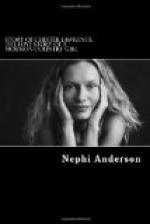“I knew a man once by the name of Lawrence,” said the minister. “I wonder if he could be related to you.”
Chester did not reply.
“I don’t know whether or not he ever went to Utah.”
“My parents were not with me in Utah. I went alone, after I was a grown man. My mother had lived there many years before, but had left. She lived in Chicago the latter part of her life; but she made a trip to Utah when she was old and feeble,—and she died there. * * * * Her grave is there now.”
The minister now was silent. His lips twitched again. Chester once more wondered why such things should affect him. The man’s arm clung to Chester firmly as if he wished support; and Chester’s heart warmed to him. Was he not Lucy’s father? Should he not know all he desired to know about the man who had expressed deep regard for his daughter?
“I think you are tired,” said Chester. “Let’s sit here and rest.”
“Yes; all right.”
“The man Lawrence whom you knew was not my father,” continued Chester. “That was my mother’s maiden name. I don’t know—I never knew my father; and shall I say, I have no wish to know a man who could treat my mother and his child the way he did. No; much as I have longed to know a father’s love and care, I cannot but despise a man who becomes a father, then shirks from the responsibility which follows—who leaves the burden and the disgrace which follow parenthood outside the marriage relation to the poor woman alone. Such baseness, such cowardice, such despicable littleness of soul!—do you wonder why I don’t want to know my father?”
Well, he had done it. Lucy’s father knew the truth of his dishonorable beginning. This highly cultured Christian minister was no doubt shocked into silence by his outburst of confidence. But he must know also that this occurred among a Christian community, long before either of the parties concerned knew of or were connected with the “Mormons.” So Chester explained this to the man at his side, who sat as if deaf to what was being said. His gaze was fixed far out to sea. His lips did not now quiver, but the lines in his face were rigid.
Chester beckoned to the daughter, and when she came, he said:
“I think your father is not well. Perhaps he ought to go below and rest.”
“Father,” cried the somewhat frightened girl, “what is it? Are you ill?”
The father shook himself as if to be freed from some binding power, looked at Chester and then at Lucy, smiled faintly, and said:
“Oh, I’m all right now, but perhaps I ought to rest a bit. Will you go down with me, Lucy?”
The daughter took his arm and was about to lead him away. He stopped and turned again to Chester.
“Excuse me,” he said, “but what was your mother’s full name?”
“Anna Lawrence.”
“Thank you. All right, Lucy. Let’s be going.”
Chester watched them disappear down the companionway, then looked out to sea at the black smoke made by a steamer crawling along the horizon, from Liverpool outward bound.




